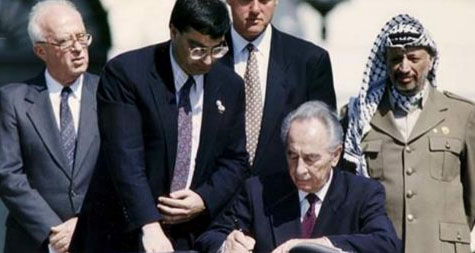Why the Palestinians should not dismantle the Palestinian Authority?

By Omar Shaban
Until this day, many Palestinians demand that the Oslo Accords, which were signed by Yasser Arafat and Yitzhak Rabin in 1993, to be rescinded. At the time the accords were hailed as the first milestone in achieving a peaceful resolution to the wider Arab-Israeli conflict. However, ever since the agreements were signed, the situation on the ground has stalled and the accords have neither ended hostilities between the two sides nor presented a coherent framework for peace. However, in my opinion, despite their shortcomings, these agreements have produced many political and social realities, and thus cannot simply be rescinded overnight.
The following article will outline the reasons for this assessment and propose a way forward.
The Oslo Accords have produced radical changes in the Palestinian and the Israeli political arena that translated into political realities that cannot be ignored. Twenty-five years after the Oslo I Accord was signed, the accords irreversibly changed Israeli-Palestinian relations.
Under the Oslo Accords, the Israeli army withdrew from the Gaza Strip and relinquished 20% of territory in the West Bank, allowing a newly established Palestinian Authority (PA) to assume responsibility in these two areas. Since then the PA has been tasked with providing Palestinians in Gaza and the West Bank with essential services such as healthcare, education, development, relief and law enforcement. Part of these efforts was the establishment of a massive public sector with more than 170,000 employees. Dismantling the PA would thus mean that more than 170,000 people would be left unemployed. Unemployment rates across the Palestinian territories, already among the highest in the world, would skyrocket as a result.
Despite the agreements’ shortcomings, there is no political consensus among Palestinians over whether to cancel the Oslo Accords or not, since many believe that the accords gave birth to a Palestinian government that represents the Palestinian people and its national aspirations of building a state. This view has recently been affirmed by Palestinian Prime Minister Mohammad Shtayyeh, who said: “We will not dissolve the Palestinian Authority, since it is a product of the struggle and resistance of the Palestinian people.”
The PA, under the Oslo Accords, was able to sign many international agreements and treaties on behalf of the Palestine Liberation Organization (PLO), the umbrella organization representing the Palestinian people around the world. Dozens of states have sent diplomatic missions to the Palestinian territories. Dissolving the PA would cause many, if not all, of these diplomatic missions to leave the Palestinian territories and cease funding. Trade and economic treaties between the PA and many other countries around the world would also end.
In addition, the PA and the Palestinian private sector, as a result of the Oslo Accords, have been able to cooperate and sign business deals with Israeli companies in many fields, including energy, construction and telecommunications. Cancelling the Oslo Accords would freeze many joint ventures between Palestinian and Israeli private sector companies, likely resulting in hundreds of millions of dollars worth of losses.
Another intifada
One of the most important aspects that would be affected by a cancellation of the Oslo Accords and the dissolution of the PA is security: Such a move would sever all security ties and coordination between the Israeli government and the PA, which could lead to the Israeli military once again assuming full control over the West Bank. This will undoubtedly lead to another major uprising, Intifada, accompanied with unprecedented levels of violence provoked by Israeli settlers in the West Bank.
Any move by the PA to unilaterally cancel the Oslo Accords will cause uproar from many countries that are considered supportive of the Palestinians. The PA will stand accused of having caused instability and chaos, despite the fact that the Israeli side had already violated the accords on numerous occasions in the past years, which has already been acknowledged by the international community. The cost of rescinding the Oslo agreements are far greater than what Palestinian society can afford from an economic and security perspective. The Palestinian political leadership understands this very well. Hence, one can read the PA’s repeated threats to cancel Oslo as political maneuvers to attract international attention and raise concerns about the relative stability of the status quo created by the Oslo accords.
A way forward: Oslo 2.0
The fate of the PA and the Oslo Accords are intricately linked: the PA was born out of the Oslo Accords. Consequently, dissolving the PA would mean by extension dismantling the Oslo Accords, meaning that we cannot talk about one without talking about the other. There are no Oslo Accords without a PA and no PA without the Oslo Accords. Therefore, several important questions arise when one thinks about dissolving the PA or the Oslo Accords: Who is going to replace the PA and fill the political vacuum created by its disappearance? Who is going to provide basic administrative, educational and security services for the Palestinians?
Several scenarios are possible: 1) the Israelis will take back civilian control as was the case before the signing of the accords or 2) a new Palestinian political leadership will emerge that will assume the PA’s place or 3) a combination of the first two scenarios.
In either case, the Palestinians should tread very carefully as they try to navigate the new political reality that would be created by a potential dissolution of the PA. They will have to find answers to many crucial questions: What will be the future of the Palestinian diplomatic missions around the globe? Can these diplomatic missions work under the auspices of the PLO and not the PA? 3) Would this even be possible given the constant lack of financial resources and low morale of the PLO?
Restoring the PLO to its former dignified status as the true representative of the Palestinian people locally and abroad is a must and would be hugely beneficial to the Palestinians. However, the question is whether the Palestinians should dissolve the PA and then start repairing the PLO or do both at the same time. Another equally important question relates to the future of the Gaza Strip: What does the future hold for Gaza if the PA is dissolved? It is almost certain that the Israeli army will only take control of the West Bank and not the Gaza Strip.
Therefore, in light of the above, it is possible and required that instead of cancelling the Oslo Accords and dissolving the PA, both are strengthened under a process that should be called “Oslo 2.0
The PA could call on the international community to mobilize to strengthen and defend the agreements signed by the Israelis and Palestinians. In my opinion, the international community should insist on a more active role from the European Union, but also encourage more participation from emerging powers such as China, India, Brazil and Turkey. Lastly, the PA can insist on imposing a strict timetable that all parties need to adhere to that would ultimately lead to the creation of a Palestinian state based on the pre-1967 borders.
However, before doing so, there are three milestones that should be achieved: 1) achieving national reconciliation and restoring national unity between all major Palestinian political forces and granting more representation to political Islam; 2) introducing radical reforms in official Palestinian institutions; and 3) encouraging a more active role and participation of Palestinians in the diaspora and thus restore their confidence in the PLO.




